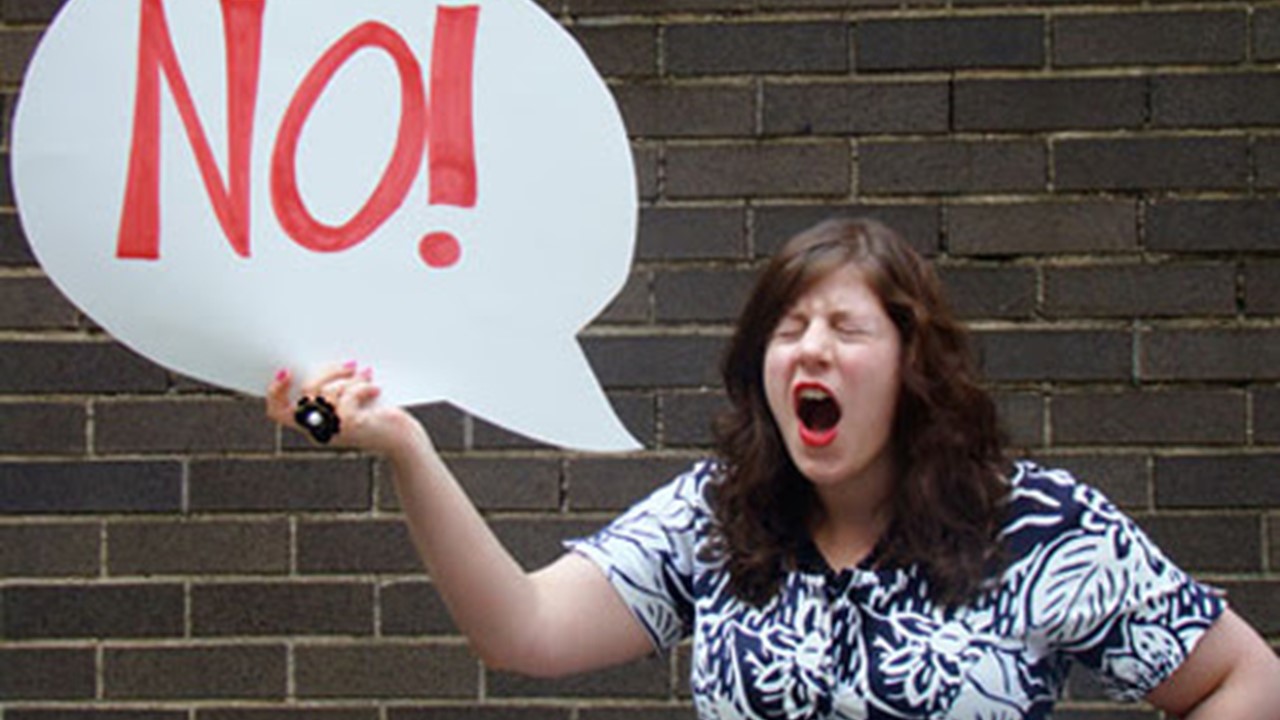How often do you say “Yes”, while your brain is screaming “No!”
Overworked Kat!
Katherine sighed and stared into her coffee. I knew she had something weighing her down, so I waited patiently.
“I am so tired! I feel like I can never catch up… my to do’s list is 3 miles long. If only my boss and husband supported me a little more, maybe I’d feel less likely to explode!” She had yet to bring her face up to look at me. “Admitting this is really embarrassing her,” I thought silently.
“What do you mean, ‘if only my boss and husband supported me’?” I inquired.
“Well… at home I take care of all the household chores, the kids, the finances, and the family calendar. Even though we both have full-time jobs, my husband seems to find the time to watch TV, exercise, and have a weekly night out with his buddies. I don’t find the time to do things like that. And my boss… don’t get me started!”
“How does your boss not support you?” I wanted her to lay it all out.
“Last week she assigned three more projects on top of the eight that I am now juggling. When I told her that I couldn’t handle anymore, she replied, ‘You’re just not trying hard enough.’ But I noticed two members of the team have less work and waste a tremendous amount of time on social media and taking long walks at lunch. They have a lot fewer projects to run. It’s damn unfair!”
Kat (a name only her friends use) was so upset, her body shook. I don’t believe that I’ve ever heard her curse. I mused silently, “This is serious and probably why we are meeting.”
While she willed herself to calm down, I reviewed what I know about my client. Kat is usually upbeat and happy. But something had changed in the 14 months since we’d had a coaching session. I needed to find out what had changed.
Kat is Not Asserting Herself
We talked for a while, with me mostly asking questions to understand her situation. In the last year, she had obtained a new job with great responsibilities and had worked hard on her personal brand – being a reliable, trustworthy, and professional problem solver. What I discovered, was that her openness to trying new experiences was biting her in the end. Her always saying “yes,” which opened many doors and led a new career and relationship, had boomeranged. Katherine could not say “No” to her boss, coworkers, husband, and her teenage children. What I discerned from my questions was that they were taking advantage of Kat’s kindness and desire to help.
Does Katherine’s situation sound like yours?
Are You as Assertive as You Need to Be?
If it does, allow me to share with you the coaching advice I delivered to her over the next few months.
If you have a hard time saying “No” and find yourself saying yes when you shouldn’t, the underlying cause is a lack of assertiveness. This does not mean that you cannot be assertive – it does mean that at the time you must assert yourself and put your needs ahead of everyone else’s’. You know how to say no, yet you may not be saying it enough or at the right times.
These are clear signals that saying yes inappropriately is hurting you.
- You feel guilty when saying, “no.”
- You have more work than time.
- You cannot get to your priorities because of the lack of time.
- How you value your precious time is low.
- People take advantage of your time and talents.
- You tend to be too nice.
Almost everything in life follows a cause and effect pattern. The Principle of Cause and Effect can be summarized this way:
- When I do that, this is what happens.
We tend to focus only on the impact of our words and actions and rarely on the cause of what is making us unhappy. These signals are what I will refer to as ‘Effect.’ They have a direct correlation to the real causes of our situation.
The High Cost of Being Unable to Say “No”
When we are not doing the appropriate things as a leader and a professional, there is a high cost that we pay. You have certain assets that are too valuable to waste!
- Your Time, and
- Your Energy
And you could be wasting them every time that you say “Yes” instead of “No.”
I am not saying that you say no to everything and to everyone. What I am saying, is that saying yes can open you to new possibilities. And saying yes can lead you to burn out! Kat was experiencing burnout from excessive stress.
Your Four-Step Plan
As your de facto coach, I want you to always feel both successful and in control of your time and energies. Here is the multi-step plan that Katherine is following to be able to assert herself and say no without demeaning her ego.
Step 1: Uncover the reasons why you cannot be assertive or say no when it is in your best interest.
When you find yourself in this situation, ask yourself these questions. And if you answer honestly, one of two of these will hit home.
- Do I have a habit of putting myself last?
Your needs are important and if you tend to place other people’s needs ahead of your own, you will, over time, devalue your self-worth. It is not an issue of someone is better. When you don’t get your needs met regularly, you cannot be the best version of you.
- Am I unable to set healthy boundaries?
The main issue is that you have not learned how to set good boundaries for yourself.
- Am I saying yes only because of an immediate urge to please someone?
People who are kind, generous and caring often do this.
- Am I saying yes because I have an immediate need for love or to maintain the connection?
Yes, you can make an emotional-based decision just because you are feeling unloved, lonely, or disconnected.
- Am I experiencing a desire or need to be acceptable, recognized, needed?
This is another indicator that you are not meeting your emotional or other needs.
- Do I carry a flawed self-definition of what being nice looks like?
You can be nice and still say no. Take some time and write down: “For me, being nice means…”
- Do I have a lack of awareness of how that behavior is perceived by others?
Unless a good friend tells you that you are wishy-washy or not assertive, it is easy to deceive ourselves. Get feedback from someone you know and trust about how you show up.
- Am I experiencing pangs of guilt that I don’t measure up, or look perfect?
No one is perfect, so dwell on why you are trying to do the impossible.
- Am I trying to prove that I can do it all, have it all?
The measures or benchmarks that you have set for yourself need revising.
These behaviors are based on relying on habit or established patterns of giving up personal power.
Which is yours? What will you do to shift this mindset?
Step 2: Apply the Assertiveness Scale.
On the Assertiveness Scale, notice where being assertive lives. People who acquiesce a lot, believe that being assertive is the same as being aggressive. People who act with assertion usually know when they cross the line to demanding. People who spend most of their time in the aggressive mode, believe they are being assertive. Therefore, self-awareness is vital to be a good leader and professional.
One more point about the Assertiveness Scale. When push comes to shove, it is hard to move from wishy-washy to assertive. You confuse the other person. Going from right to left is nearly impossible. If you start out demanding, you cannot move to the left without the other person questioning your motives.
Step 3: Focus on the Outcome with a Plan and an Intention.
Your intention is easy – be graceful and help the person out. Your plan will derive from that overall intention.
The best way to accomplish this step is to always pause when someone asks you to do something. You can be both graceful and professional by responding in these assertive ways:
“Before I say yes, I will take {name the time} to determine how this fits into my priorities.”
“I know that is not going to work for me… right now.”
“It’s wonderful that you asked me. I must say no. Can we revisit your ask, in {name a time period]?”
“I know right now that I am unable to do that. However, can we take a few moments to think about who else you can assign this to?”
I hope my suggested responses will spark the best way for you to respond with grace.
Last Step
Here is a visual game plan to keep handy so that you don’t automatically say yes when you should be saying no. Separately and together, these positive actions will help you feel comfortable asserting yourself.
If you find yourself saying, “yes” or failing to be assertive more, pay attention and change your approach. As you develop a new habit, pause and ask yourself: “Am I wanting to please? Needing love/connection? Failing to put my needs first? Needing approval? Relying on habit?”
And most important of all, ask yourself:
Why am I wasting my time and energy doing something that doesn’t fulfill me?
Ron Rael Leadership Provocateur, is a keynote speaker, consultant, and author.
Follow Ron on Twitter: @leaderexpert
Schedule a Call with Leadership Expert, Ron Rael


